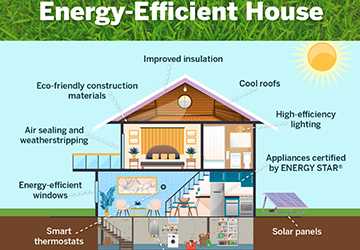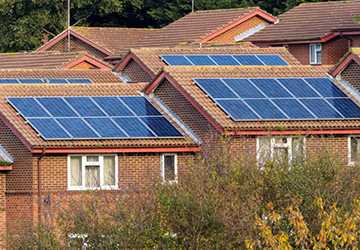Think of a world where our energy sources are never diminished. As our non-renewable resources continue to decrease, it is time to adopt energy efficiency, i.e., energy conservation with sustainable technology.
But where do you start your energy-efficient journey? The answer lies right within your home. An energy-efficient home will benefit our environment and result in substantial savings on your energy bills.

Your wise choices will reduce your carbon footprint and make your living space more comfortable.
An energy-efficient home has significant advantages, from lower utility expenses to better indoor air quality. When you invest in home energy efficiency, you build a healthy and sustainable lifestyle for yourself and your family and help out the environment.
Read on to learn ways small changes make a difference for your wallet and the world around you.
In today's world, an energy-efficient home is not an option but a necessity. Knowing why an energy-efficient home is essential will help you make changes to your life that will be cost-effective and work toward a greener future.
An efficient home has become an aptly timely solution for soaring energy prices and even more significant environmental concerns. You will save on your bills and reduce your ecological footprint by saving energy.
Building an energy-efficient home is relatively easy and affordable. Changing to LED light bulbs, sealing air leaks, or turning the thermostat up or down a few degrees significantly affects energy use.
Energy-efficient appliances and proper insulation are expensive initially; however, the long-term benefits and savings are worth more than any investment.
Now that you appreciate the need for energy efficiency let's discuss the five most convincing benefits of making your home more energy efficient. These benefits will motivate you to save and develop a more sustainable living space.
One of the biggest payoffs of having an energy-efficient home is less energy use, which translates into lower utility bills. Insulations of invested-in windows and efficient appliances serve to reduce loss and optimize energy extensively.
A high-efficiency HVAC system can save up to 20% on heating and cooling costs, while energy-efficient appliances save hundreds of dollars in electricity bills every year.
Energy-saving homes help cut our carbon footprints and drive toward a more beneficial, healthier overall environment. They maintain a reduced energy footprint, fewer greenhouse gas emissions, and conserve natural resources.
Examples of the eco-friendly practices include:
● Use of renewable energy resources, e.g., solar panels
● Conserving water with low-flow fixtures
● Waste minimization by recycling and composting
You can use these practices to help the environment and reduce climate change.
Energy-efficient homes enhance the quality of life by maintaining uniform indoor temperatures. Some additions that help keep the house warm include more insulation, HVAC equipment that conserves energy, and airtight construction to eliminate drafts.
These improvements keep you warm during extreme weather conditions and ensure better air quality within the house.
The decrease in infiltration of outdoor pollutants and allergens positively impacts the creation of a healthier space for people to live in.
Energy-saving features can drive even the resale value upwards. Nowadays, an energy-efficient home is very appealing in the real estate market. Some buyers have started thinking of cost-saving and sustainable houses as objectives.

In this regard, some great selling points include solar panels, smart thermostats, and double-paned windows. In fact, in many U.S. states, there are financial incentives like tax credits and rebates for making energy-saving improvements, thus adding to the value of your investment.
A more energy-efficient home promotes better health for you and your family. In addition to using non-toxic building materials and better ventilation, a more energy-efficient home reduces indoor pollutants and allergens, reducing potential health risks.
Due to improved air quality, people living in energy-efficient homes are much more comfortable with respiratory conditions such as asthma and allergies.
Meanwhile, stable temperatures in energy-efficient homes with the corresponding lack of drafts tend to minimize the health risks more typically associated with mould and mildew.
Of course, energy-efficient homes save a lot of money and provide enhanced comfort and a healthy environment for families.
It would help if you made quick decisions considering the benefits of transforming your home into an energy-efficient place. The time for energy efficiency is now. Making your home more energy-efficient saves not only bucks in your pocket but also saves the planet.
Don't squander this opportunity; make the future more sustainable for yourself and future generations by getting involved with this community of homeowners who have enjoyed living in energy-efficient homes.
Make simple changes immediately to start your journey with us. Let's shape a green future.
Q. What are some of the best ways to turn my house into an energy-efficient home?
Ans. Insulate and replace windows with energy-efficient ones and install Energy Star-rated appliances. Seal up air leaks, use LED lights, and set your thermostat to be more efficient.
Q. Do energy-efficient houses cost more to build or buy?
Ans. Initially, energy-efficient homes may be more costly due to the enhanced quality and improved appliances. However, these initial high costs can be cushioned against the long-term energy savings and increased property value that will result.
Q. How can I find out how energy-efficient my house is now?
Ans. Conduct a home energy audit to identify areas of energy loss and areas for improvement. Many utility companies offer their customers free or low-cost energy assessments.
Q. Can I upgrade my home to be more energy-efficient without significant renovations?
Ans. Even minor adjustments, such as sealing air leaks, using energy-efficient bulbs, and maintaining HVAC systems, improve efficiency. Therefore, minor upgrades over time contribute to energy savings but do not need wide-scale renovation.